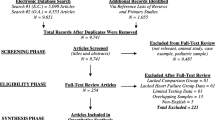Abstract
This follow-up study to Keith et al. (2002) sought to explore relations between the cognitive, neuropsychological, and psychosocial sequelae of cardiopulmonary bypass surgery (CPB) and survival. A neuropsychological test battery including the state portion of the State-Trait Anxiety Inventory (S-STAI), reaction time, visual attention (VFA), rotor pursuit, visual spatial memory, verbal memory and paired associations (PA) was administered. PA (P < .05), VFA and S-STAI scores were related with 5–7 year survival. After the Benjamini-Hochberg method was employed to control for multiple comparisons only S-STAI scores remained significant. Results of logistic regression indicate that pre-CPB surgery scores on the S-STAI accurately predicted 5–7 year survival and mortality in 66% and 83% of cases respectively.

Similar content being viewed by others
References
Baker, R. A., Andrew, M. J., Schrader, G., & Knight, J. L. (2001). Preoperative depression and mortality in coronary artery bypass surgery: Preliminary findings. ANZ Journal of Surgery, 71(3), 139–142.
Brainmetric. (1991a). Memory match [computer software]. Berlin, NJ: Author.
Brainmetric. (1991b). Visual field attention [computer software]. Berlin, NJ: Author.
Chute, D. (1994). Maclaboratory for psychology: Research (version 3.0) [computer software]. Pacific Grove, CA: Brooks/Cole Publishing.
Connerney, I., Shapiro, P. A., McLaughlin, J. S., Bagiella, E., & Sloan, R. P. (2001). Relation between depression after coronary artery bypass surgery and 12-month outcome: A prospective study. Lancet, 358(9295), 1766–1771.
Edell Gustafsson, U. M., & Hetta, J. E. (1999). Anxiety, depression and sleep in male patients undergoing coronary artery bypass surgery. Scandinavian Journal of Caring Sciences, 13(2), 137–143.
Frasure-Smith, N., & Lesperance, F. (2003). Depression and other psychological risks following myocardial infarction. Archives of General Psychiatry, 60(6), 627–636.
Fritz, H. G., Brandes, H., Bredle, D. L., Bitterlich, A., Vollandt, R., Specht, M. et al. (2003). Post-operative hypoalbuminaemia and procalcitonin elevation for prediction of outcome in cardiopulmonary bypass surgery. Acta Anaesthesiologica Scandinavica, 47(10), 1276–1283.
Jarvinen, O., Huhtala, H., Laurikka, J., & Tarkka, M. R. (2003). Higher age predicts adverse outcome and readmission after coronary artery bypass grafting. World Journal of Surgery, 27(12), 1317–1322.
Keith, J. R., Puente, A. E., Malcolmson, K. L., Tartt, S., Coleman, A. E., & Marks, H. F., Jr. (2002). Assessing postoperative cognitive change after cardiopulmonary bypass surgery. Neuropsychology, 16(3), 411–421.
Kochanek, K. D., Murphy, S. L., Anderson, R. N., & Scott, C. (2004). Deaths: Final data for 2002. Hyattsville, Maryland: National Center for Health Statistics.
Murkin, J. M., Boyd, W. D., Ganapathy, S., Adams, S. J., & Peterson, R. C. (1999). Beating heart surgery: Why expect less central nervous system morbidity? The Annals of Thoracic Surgery, 68(4), 1498–1501.
Newman, M. F., Croughwell, N. D., Blumenthal, J. A., White, W. D., Lewis, J. B., Smith, L. R. et al. (1994). Effect of aging on cerebral autoregulation during cardiopulmonary bypass. Association with postoperative cognitive dysfunction. Circulation, 90(5 Pt 2), II243–249.
Salamonsen, R. F., Schneider, H. G., Bailey, M., & Taylor, A. J. (2005). Cardiac troponin i concentrations, but not electrocardiographic results, predict an extended hospital stay after coronary artery bypass graft surgery. Clinical Chemistry, 51(1), 40–46.
Speilberger, C. D., Gorsuch, R. L., & Lushene, R. E. (1970). Stai manual: Consulting Psychologists Press.
Thissen, D., Steinberg, L., & Kuang, D. (2002). Quick and easy implementaion of the benjamini-hochberg procedure for controlling the false positive rate in multiple comparisons. Journal of Educational and Behavioral Statistics, 27(1), 77–83.
van de Wal, R. M., van Brussel, B. L., Voors, A. A., Smilde, T. D., Kelder, J. C., van Swieten, H. A. et al. (2005). Mild preoperative renal dysfunction as a predictor of long-term clinical outcome after coronary bypass surgery. Journal of Thoracic and Cardiovascular Surgery, 129(2), 330–335.
Weschler, D. (Ed.) (1981). Weschler adult intelligence scale-revised manual. New York: Psychological Corporation.
Weschler, D. (Ed.) (1984). Weschler memory scale-revised Manual. New York: Psychological Corporation.
Acknowledgments
The authors gratefully acknowledge the continued support of the volunteers as well as Kimberly Hill who assisted in data gathering. An earlier version of this study was presented at the annual meeting of the American Psychological Association (2004) in Honolulu, HI.
Author information
Authors and Affiliations
Rights and permissions
About this article
Cite this article
Morrill, E.F., Richardson, E., Keith, J.R. et al. Predictive value of neuropsychological assessment; with regards to life expectancy among cardiac bypass surgery patients. J Clin Psychol Med Settings 13, 332–336 (2006). https://doi.org/10.1007/s10880-006-9036-5
Published:
Issue Date:
DOI: https://doi.org/10.1007/s10880-006-9036-5




